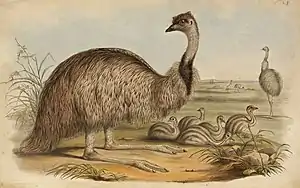
The Birds of Australia was a book written by John Gould and published in seven volumes between 1840 and 1848, with a supplement published between 1851 and 1869.[1] It was the first comprehensive survey of the birds of Australia and included descriptions of 681 species, 328 of which were new to Western science and were first described by Gould.[2]
Gould and his wife Elizabeth née Coxen travelled to Australia from England in 1838 to prepare the book. They spent a little under two years collecting specimens for the book. John travelled widely and made extensive collections of Australian birds and other fauna. Elizabeth, who had illustrated several of his earlier works, made hundreds of drawings from specimens for publication in The Birds of Australia.[3]
The plates of the book were produced by lithography, and have been hand-coloured by Gabriel Bayfield's studio.[4] Elizabeth produced 84 plates before she died in 1841, Edward Lear produced one, Benjamin Waterhouse Hawkins contributed one and the remaining 595 plates were produced by H. C. Richter from Elizabeth's drawings and were published under his name.[5][6] The accompanying letterpress descriptions of the birds are authored by John Gould and were printed by the firm R. & J. E. Taylor.[7]
Birds of Australia was issued in parts to subscribers - in all there were 250 subscribers, and so 250 sets of the seven-volume work were printed.[5] Complete sets of original volumes recently sold at auction for more than A$350,000.[8] It was published in a folio format that measures 57cm in height. Of the original 250, 175 of those are now accounted for in institutional collections, and the remaining 75 are in private hands or have been broken up to be sold as individual prints.[9]
The work was preceded by Gould's A Synopsis of the Birds of Australia, intended as a promotion for the sale of subscriptions to the larger work. The coloured plates included montages of birds heads, crops of illustrations by Elizabeth Gould or artwork that Gould purchased from Edward Lear. Lear sold illustrations he had not included in his celebrated works to Gould, such as Illustrations of the Family of Psittacidae, or Parrots, and Gould in turn printed the images in reverse and amongst the works of other artists; the lack of attribution to Lear and others is thought to have been Gould's assumption of authorship by his purchase of their works.[10]
In 1865 Gould published a revised and updated version of the text of The Birds of Australia in the two-volume Handbook to the Birds of Australia.
References
- ↑ "Rare Book - Gould, John, The Birds of Australia Vol.IV, London, 1848". Museums Victoria Collections. Museums Victoria. Retrieved 2020-05-06.
- ↑ "Rare Book - Gould, John, The Birds of Australia Vol.IV, London, 1848". Museums Victoria Collections. Museums Victoria. Retrieved 2020-05-06.
- ↑ Linda Hall Library. Portraits of 12 Scientific Illustrators from the 17th to the 21st Century Archived 2006-09-28 at the Wayback Machine
- ↑ "Rare Book - Gould, John, The Birds of Australia Vol.IV, London, 1848". Museums Victoria Collections. Museums Victoria. Retrieved 2020-05-06.
- 1 2 Hetherington, M. John Gould's Birds of Australia in Peter Cochrane ed. Remarkable Occurrences: The National Library of Australia’s First 100 Years, 1901–2001. National Library of Australia
- ↑ Kenneth Spencer Research Library. John Gould, his birds and beasts - John and Elizabeth Gould
- ↑ "Rare Book - Gould, John, The Birds of Australia Vol.IV, London, 1848". Museums Victoria Collections. Museums Victoria. Retrieved 2020-05-06.
- ↑ Kells, F and Kells, S. 2000. The Australian Book Auction Records. Library and Information Science Research ISSN 1058-6768
- ↑ "Rare Book - Gould, John, The Birds of Australia Vol.IV, London, 1848". Museums Victoria Collections. Museums Victoria. Retrieved 2020-05-06.
- ↑ Peck, R. McCracken (2006). The natural history of Edward Lear (1812-1888). Suffolk: ACC art books. pp. 15, 71–72. ISBN 9781851498307.
External links
- The Birds of Australia: in seven volumes / John Gould - National Library of Australia collection copy of the 1848 edition - digitised
- The Birds of Australia at Project Gutenberg - Volume 2, 3, 4
- "From nature, to stone, to paper: Gould's birds of Australia". State Library of South Australia. Shows before-and-after colouration of seven black and white lithographed prints.